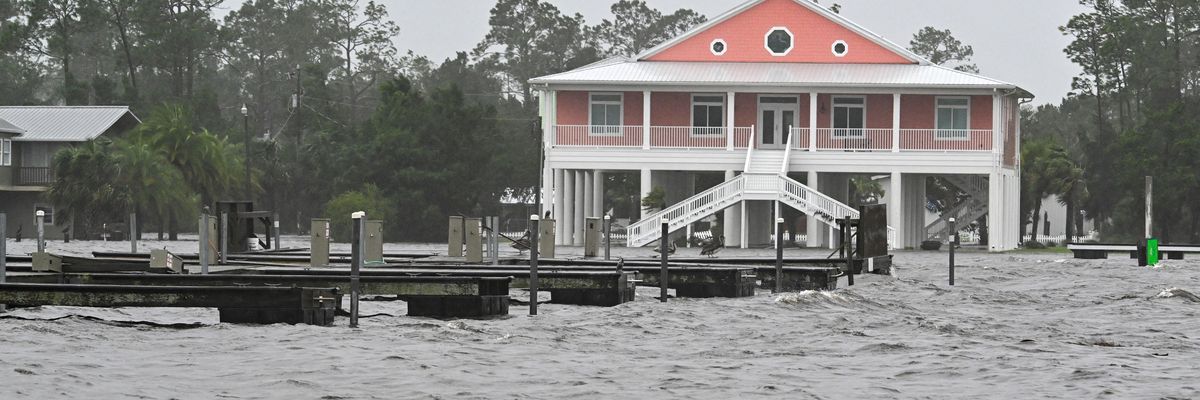With extreme weather disasters increasing in frequency and intensity as the global climate crisis rages, wealthy homeowners in some coastal areas of the United States are paying six figures a year to insure their houses against flooding and other impacts of the kind that Hurricane Idalia brought to Florida last week.
Bloomberg's Felipe Marques and Devon Pendleton reported Thursday that the owner of a $50 million mansion on Florida's Star Island was given a $622,000-per-year quote for home insurance.
"Granted, that was a recent quote for a policy on one of the ultraluxe mansions on the Biscayne Bay island, where A-listers like Rick Ross, Ken Griffin, and Alex Rodriguez own homes. But, only last year, the same policy cost $200,000," Marques and Pendleton wrote. "Even for the moderately wealthy, insurance costs are beginning to verge on unaffordable: The cost of so-called high-value insurance, loosely defined as policies covering homes worth more than $1 million, is outpacing the rise in premiums for more modestly valued homes by anywhere from two to 70-fold."
Surging home insurance premiums for the rich underscore a broader crisis that is disproportionately impacting regular homeowners who live in areas particularly vulnerable to climate chaos.
"Insurance premiums are soaring as climate risk grows, pricing everyone but the wealthy out of some coastal areas," Marques and Pendleton wrote. "Even before Hurricane Idalia hit Florida's Gulf Coast last week, leaving a trail of destruction in its wake, tens of thousands of ordinary Floridians were struggling to find affordable policies."
This year alone, the U.S. has seen a record 15 extreme weather disasters that caused damage exceeding $1 billion, a number that scientists say is likely to increase unless urgent action is taken to phase out fossil fuels.
"They've underwritten financing fossil fuels, and then they profit from selling protection from the impacts of those fossil fuels on climate."
With climate risks growing exponentially, major insurers have jacked up rates, restricted coverage in disaster-prone areas, and even withdrawn entirely from states.
"At least five large U.S. property insurers—including Allstate, American Family, Nationwide, Erie Insurance Group, and Berkshire Hathaway—have told regulators that extreme weather patterns caused by climate change have led them to stop writing coverages in some regions, exclude protections from various weather events, and raise monthly premiums and deductibles," The Washington Post reported earlier this week.
Farmers Insurance, one of the nation's largest home insurance providers, announced in July that it would no longer cover properties in Florida. The move followed State Farm's decision in May to stop selling homeowners' insurance in California.
"Wildfires, hurricanes, thunderstorms, and flash floods have wreaked havoc across the U.S. this year, and after each disaster, homeowners have looked to their insurance providers to defray their losses," Carly Fabian, insurance policy advocate with Public Citizen's Climate Team, said Thursday. "More and more often, those companies have packed up and moved on, leaving homeowners fewer and fewer options for insurance."
"The growing insurance crisis illustrates the vital importance of seeing climate change as a risk to the entire financial system," Fabian added. "Year after year, disasters with multi-billion dollar price tags have struck around the globe."
The industry's response to escalating climate risk has drawn greater attention to insurers' role in fueling the crisis.
Last month, Sens. Sheldon Whitehouse (D-R.I.), Ron Wyden (D-Ore.), and Bernie Sanders (I-Vt.) noted in a letter to insurance giants that "U.S. insurers currently have approximately $582 billion invested in fossil fuels—with nearly $90 billion in coal alone."
"U.S. insurers continue to underwrite polluting projects while making investments in an industry whose continued expansion poses multiple serious dangers to overall economic stability and to insurance services in particular," the senators wrote.
During a Senate Banking Committee hearing on Thursday, Sen. Elizabeth Warren (D-Mass.) said that insurance companies "have kind of been playing every part of this game."
"They've underwritten financing fossil fuels, and then they profit from selling protection from the impacts of those fossil fuels on climate. Now when climate risks are rising, they're trying to hang American families out to dry."




